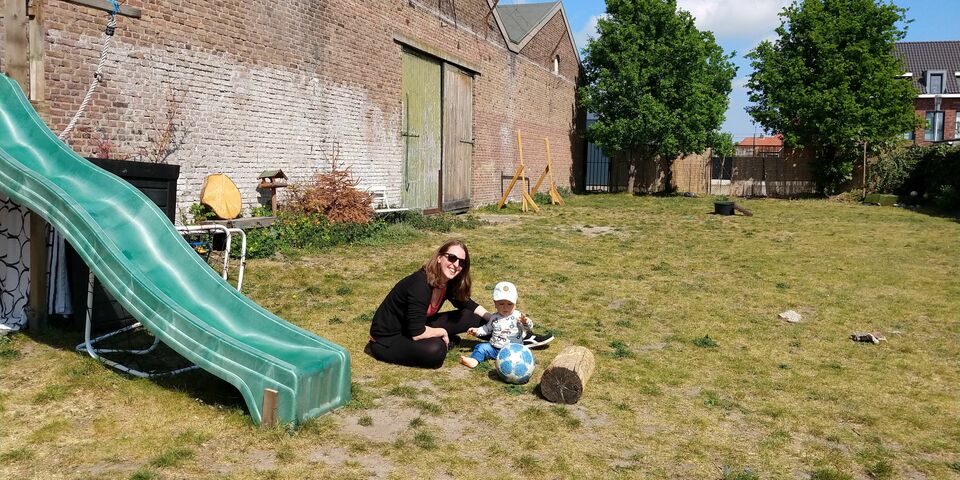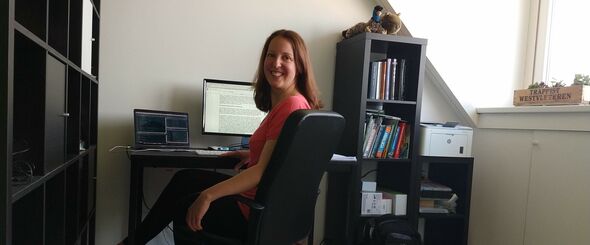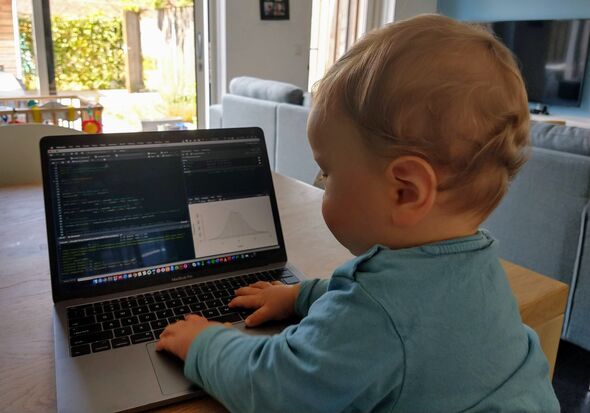“I am recording lectures at home”
Working from home during this time of corona crisis is slowly becoming our new normal. We are learning to work with the changing parameters and negotiating our own personal pitfalls, adjusting to the demands of homeworking, and missing the campus and each other like never before. Cursor regularly calls a fellow homeworker to hear how they are doing. Today, Federica Eduati, Assistant Professor of Computational Biology, who tries to understand why patients tend to respond differently to cancer treatment - while her ten-month-old baby boy plays close by.
In a way, Federica Eduati is lucky that her field is quite theoretical. “This makes it much easier to work from home, of course. I make mathematical models of how the cells of cancer patients behave during treatment. It is known that each patient tends to respond in a different way to therapy, which is one of the reasons why it is so hard to cure cancer.” She does also collaborate, however, with experimentalists here at the university and at the NKI (Netherlands Cancer Institute), as well as with medical doctors at Catharina Hospital, she says. “In the long run, we are dependent on lab work carried out at the NKI. Progress there has slowed, but they are still working, just at a slower pace.”
Similarly, she is also finding it an effort to work at her normal pace, since she is working from home with her ten-month-old son Alessandro around, as well as her boyfriend, who works for ASML. “He does computational work, like me, but we both have a lot of online meetings. So in principle we split the day in two.” The one who is not babysitting gets to use the small office on the second floor, while the other might try to get some work done in the living room.
“We try to be as flexible as possible. During some meetings I mainly have to listen, which I can do while taking care of the baby.” Online meetings do have the advantage that you don’t spend time traveling, this Italian researcher has learned. “I can switch instantly between meetings with people from the hospital and the university. In a way, of course, this is really convenient. I can imagine that we will carry on meeting online more often once this situation is over.”
Eduati, who started working at TU/e two years ago, lives in a ‘typically Dutch’ home in Eindhoven's Stratum neighborhood. “We have three floors and a garden, fortunately. And we can use the bigger garden owned by the gym next door; they are not using it now, obviously, so they let us use it. That’s nice.”
Both the assistant professor and her boyfriend are from the north-east of Italy, the region in Europe that was most heavily affected by the new coronavirus in the early stages of the pandemic. “My parents and in-laws live not far from Venice,” she tells. “Italy is still in complete lockdown, though they are planning to relax the measures somewhat. I suppose that factories will open again soon, but schools will remain closed, at least until after the summer.”
She thinks that other European countries have been lucky, in the sense that they had time to learn how serious the pandemic is by watching the situation unfold in her home country. “In Italy, they first tried some more relaxed measures, like social distancing, but it seems that people did not take them seriously enough. Social distancing is not something that comes naturally to Italians, of course. We tend to be very close with our parents and grandparents.”
Video calls
Her son’s grandparents used to come to Eindhoven quite frequently, she says, as traveling by plane was easy and cheap between Venice and Eindhoven. “Now that this is no longer possible, we try to manage with daily video calls. They really need this to keep their spirits up; even after the lockdown becomes less strict, they will probably stay at home as much as possible because their age puts them at risk.” In some ways, however, distance has become quite a relative notion. “My brother lives not far from my parents, but they cannot meet either, of course.”
Lectures
Eduati is currently supervising a PhD candidate, two master’s students and two bachelor’s students from home. “I used to have weekly meetings in person with my students; now we meet online. And I also encourage them to contact me outside those meetings. It takes a bit more time, but it works.” Besides this, the assistant professor is currently teaching a bachelor’s course on oncology. “I am recording lectures for this course at home, and the students are also getting lectures from other experts at our department and from medical doctors at Catharina Hospital, some of which are live, and others recorded. It all takes quite some time to organize. It is a DBL course, so the students will also have to meet online in groups to define a project.”
With daycare facilities in the Netherlands set to open again soon, life may become a little easier for Eduati and her boyfriend. “Alessandro used to go there for 3.5 days a week, so we hope that will be possible again. Although, I must say, he has adopted a nice rhythm over the past few weeks, sleeping well at night and taking regular naps during the day. We hope that won’t change when he goes back to daycare!”




Discussion